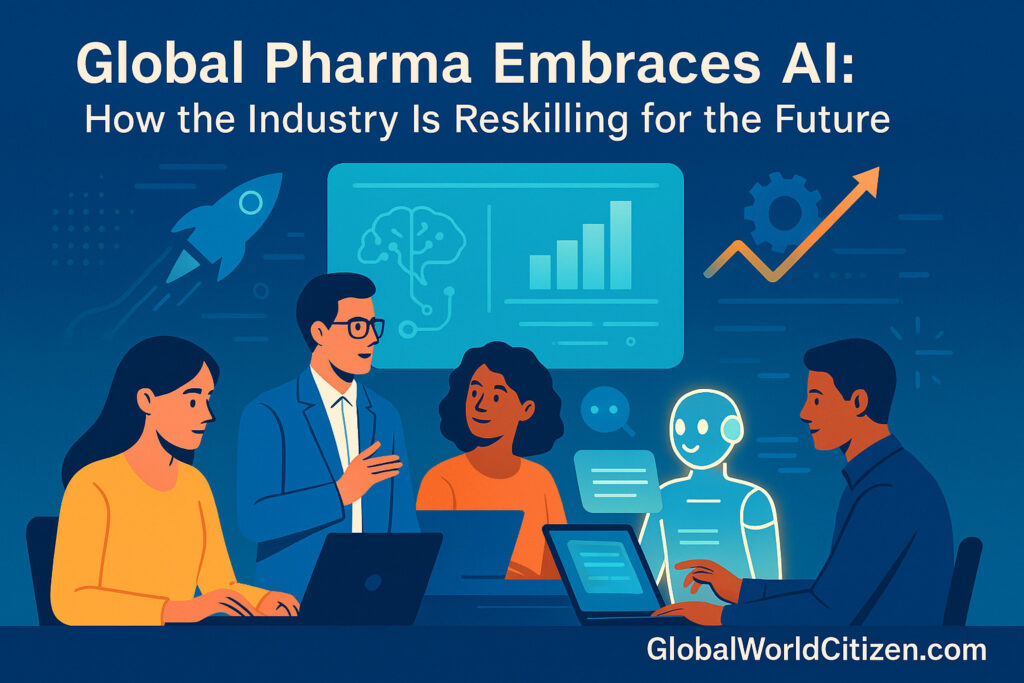Published: March 26, 2025 ✍️ By Global World Citizen Editorial Team 🔗 Source: GlobalWorldCitizen.com
As artificial intelligence (AI) continues to redefine productivity and innovation across industries, leading pharmaceutical companies are taking bold steps to upskill their global workforce for an AI-powered future.
From North America to Europe and Asia, pharmaceutical giants are investing heavily in generative AI (GenAI) literacy—turning traditional scientists, researchers, and operations staff into “bilingual” professionals who speak both the language of life sciences and the algorithms of machine learning.
 AI Training Goes Mainstream at Johnson & Johnson
AI Training Goes Mainstream at Johnson & Johnson
At Johnson & Johnson (J&J), the push toward a digitally fluent workforce is reshaping the organization’s DNA. Over 56,000 of J&J’s 138,000 global employees have completed required GenAI training, making it a prerequisite for utilizing generative tools across departments such as R&D, supply chain, and finance.
“AI is now core to everything from summarizing research to engineering prompts for language models,” says Jim Swanson, Chief Information Officer at J&J. “We had to create a curriculum—and more importantly, a mindset—around upskilling.”
J&J also launched a comprehensive digital bootcamp, covering AI, augmented reality, and automation. With over 14,000 participants logging more than 37,000 hours of training, it’s part of a growing commitment to continuous learning.
 GenAI Is Transforming Drug Discovery and Development
GenAI Is Transforming Drug Discovery and Development
The pharmaceutical industry is betting big on AI to accelerate innovation. From identifying novel drug compounds and optimizing clinical trials to streamlining regulatory submissions and refining marketing, AI is helping pharma firms unlock enormous value.
Goldman Sachs estimates that AI could help the pharma industry save tens of billions of dollars annually by improving drug development productivity.
At Merck, makers of Keytruda and Gardasil, the in-house GPTeal platform integrates tools like ChatGPT and Claude into secure internal systems. More than 50,000 Merck employees use it regularly—for tasks ranging from composing memos to drafting regulatory filings.
“We’re now focused on identifying use cases that will have a dramatic impact on our business,” says Ron Kim, Merck’s CTO. “AI is freeing up our scientists to focus on what they do best—science.”
 Beyond Scientists: Upskilling for a Hybrid Workforce
Beyond Scientists: Upskilling for a Hybrid Workforce
The future of pharma won’t just belong to biochemists and lab technicians. AI engineers, prompt designers, data scientists, and hybrid roles that blend technical and scientific expertise are rapidly emerging.
“Tomorrow’s workforce must speak both biology and AI,” explains Deborah Golden, Chief Innovation Officer at Deloitte U.S. “That hybrid fluency is becoming a competitive advantage.”
To foster that fluency, companies are creating AI certification programs, immersive boot camps, and internal competitions like Eli Lilly’s “AI Games”—a gamified initiative encouraging employees to use GenAI in creative ways, such as writing chatbot messages or designing quizzes based on company history.
 AI for Startups: A Lean Efficiency Strategy
AI for Startups: A Lean Efficiency Strategy
For smaller players like Blue Earth Therapeutics, a clinical-stage biotech startup, AI offers scalability without heavy overhead. With only 20 full-time employees, the company plans to offer AI certifications and online training as it expands.
“The potential for AI to drive efficiency is tremendous,” says Dr. Daniel Stevens, Blue Earth’s Chief Medical Officer. “As we grow, we’ll integrate AI training into our strategy from day one.”
 Embracing AI with Caution—and Confidence
Embracing AI with Caution—and Confidence
While some global corporations like Apple and Amazon have restricted the use of tools like ChatGPT, others like Eli Lilly are taking the opposite approach—encouraging usage while educating staff on responsible AI practices.
“Use it, but use it wisely,” says Diogo Rau, Chief Digital Officer at Eli Lilly. “Just like search engines, generative AI is a tool—but one that needs clear guardrails.”
Eli Lilly now requires AI certifications for all managers and senior leaders, and is incorporating GenAI into performance reviews and strategic planning.
 Final Word: The Future Is Human + AI
Final Word: The Future Is Human + AI
As the global pharmaceutical industry races to leverage AI for better health outcomes, one thing is clear: AI is not replacing people—it’s empowering them.
From Silicon Valley to Seoul, and Austin to Amsterdam, the pharma workforce is being reshaped by human-machine collaboration. AI is helping researchers do better science, freeing up time for creative problem-solving, and enabling faster, more precise healthcare breakthroughs.
At GlobalWorldCitizen.com, we’ll continue to spotlight the innovations transforming industries and improving lives across the globe.


